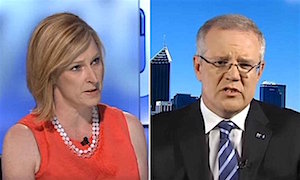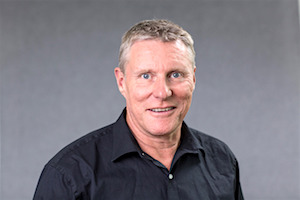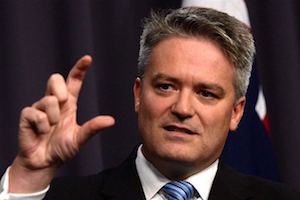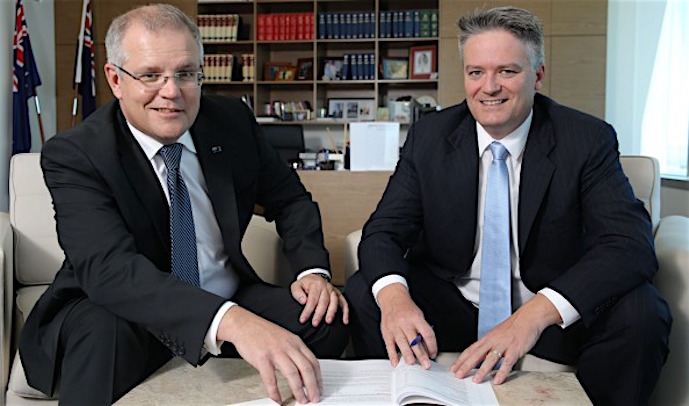-
19/06/2016
-
Ad astra
-
jobs and growth

Good
Daleks are hard to find. They’re expensive. But for the Treasury and the Department of Finance, no cost is too high. So they spared no expense in their search for reliable Daleks that could repeat their messages tirelessly. They had hoped to find some with a rudimentary knowledge of economics and some understanding of finance, but had to settle for ones that at least could recite mind-numbing messages repeatedly and consistently.
After a long search, and after discarding some defective ones that seemed incapable of learning their lines, they settled on DM and DC as their primary Daleks, and KO’D as a trainee.
DC had had previous experience in finance, and had been programmed so often to repeat the same words and phrases that he needed no further programming. He was brilliant. No matter what the question, he would repeat the same mantras and catchphrases with his inimitable accent, which had an insistent Germanic tone to it. Indeed, he was so good that he became a tutor for DM who previously had been used in Immigration. DC tried to tutor KO’D, but gave up – she was too inclined to go off-message.
When DM was in Immigration, he had been programmed to repeat ‘Stop the boats’; ‘We’ll turn the boats around when safe to do so’; ‘We don’t discuss on-water operational matters’; ‘This government is not running a shipping news service for people smugglers’; ‘We are running a military-led border security operation which is stopping the boats’; and ‘We’ve taken the sugar off the table’.
When he was used in Social Services he would repeat: ‘The age of entitlement is over’, a mantra used by another Dalek, discarded because he was past his expiry date and had been exported second-hand to the US. It must have been an oversight, but DM was not programmed to label people as either ‘lifters’ or ‘leaners’.
The programmer of these Daleks was so skilful that they always repeated the same phrases, word perfect, again and again and again, so much so that anyone remotely interested in politics could recite them by heart. Some voters, too wedded to political discourse on TV for their own good, slowly became obsessive-compulsive, and sat in their corner of the psychiatric ward muttering the lines they had heard so often. “Jobs and Growth’ was so imprinted that it was impossible to erase this mindless utterance. Every time the TV was turned on, there were the Daleks regurgitating their lines, over and over, monotonously, word perfect.
What’s more, they were carefully programmed:
- to talk quickly, as if firing verbal bullets’;
- to talk loudly;
- to talk incessantly;
- to repeat their words over and again;
- to talk over their interviewers, and ’never take a breath’;
- to avoid answering questions they didn’t like’; and
- to answer such questions with “I don’t accept your characterisation".
The programmer guaranteed that with such tactics it would be impossible to ignore them, impossible to escape them.
Joseph Goebbels knew that if you told a lie often enough, the people would eventually believe it. What’s more, he knew that the bigger the lie, the more the people would be drawn to it. The Dalek programmer knew this too, so it was of no consequence if the words he programmed into the Daleks were wrong, were untrue, were senseless, or had no meaning, so long as they served a political purpose.
Any new device needs testing, so the programmer got DM and DC together to try them out with some talented ABC interviewers, Leigh Sales and Michael Brissenden, who took it in turns to see if they could trip them up.
Leigh Sales began by trying to catch DC off guard:
LEIGH SALES: Against the backdrop of the campaign, Australia has just posted the slowest wage growth in decades. Between that, low inflation, low productivity and a stubborn deficit, do politicians need to level with Australians and say to them that they're unlikely to continue enjoying rising standards of living?
DC: Well our economy's an economy in transition. We're dealing with global economic headwinds, we're dealing with lower global economic growth and we're dealing with much lower global prices for our key commodity exports and that is of course why it is so important that we continue to implement our plan for jobs and growth. And, I mean, if you look at the results that we've achieved so far, the economy is growing at three per cent - higher than any of the G7 economies, double the rate of Canada, employment growth is strong, the unemployment rate at 5.7 per cent is not as low as we would want it to be, but it is much lower than what had been anticipated when we came into government in 2013. So we've got to keep heading in the same direction, we've got to keep implementing our plan for jobs and growth, including a more competitive enterprise tax rate.
Head spinning, she turned to DM:

LEIGH SALES: You talk a lot about your ‘plan’; the electorate still doesn’t understand what it is:
DM: The budget is an economic plan to ensure that we provide for growth and jobs to drive this transition that is occurring in our economy.
Australians know that our economy is transitioning and they know there are great risks and threats to it. This budget is the economic plan, which will support that growth that supports those jobs by backing in the investment that is needed to make it happen.
Michael Brissenden jumped in to chance his arm with DC:


MICHAEL BRISSENDEN: Alright. On the broader economic policy issues, what exactly did Treasurer Scott Morrison mean when he said the government
may have to ‘recalibrate’ its policy mix after the election?
DC: Well you know, obviously we have a very clear national economic plan for jobs and growth but as you know, we have always - as we have done in the past and as we continue to do moving forward, we'll always make judgements based on the circumstances as they evolve to ensure Australia's…
MICHAEL BRISSENDEN: So everything could be back on the table?
DC: No, that is not right. I don’t accept that characterization. I think that everybody knows that we are focused on implementing our plan for innovation to support start up businesses everywhere.
Everybody knows we're focused on implementing our defence industry plan to support local high-end manufacturing.
Everybody knows we're focused on rolling out our export trade deals, which help our exporting businesses.
And everybody knows that we're focused on making our tax system more growth friendly, delivering business tax cuts paid for by crack downs on tax avoidance and by better targeting relevant tax concessions.
Now, obviously as economic circumstances evolve and as we continue to face economic headwinds, we pursue opportunities and we will continue to do everything we can to ensure that Australia is as strong as possible.
An economic foundation to take advantage of the opportunities but also to be resilient in the face of any challenges. We must live within our means!
MICHAEL BRISSENDEN: And the political realities may mug you as well after the election, you may be forced to change things because you can't get stuff through the Senate for instance.
Nick Xenophon tells us that he has some pretty serious reservations about the company tax cut, extending beyond businesses earning over the turnover of 10 million.
So you may have to compromise on some things including some of the centrepiece of your election budget strategy.
DC: Well our message to the Australian people is that if you want us to implement our plan for jobs and growth, if you want us to implement a plan that would help secure our successful transition from resource investment driven growth to broader drivers of growth, then support our candidates, yes in the House of Representatives but also give us your vote in the Senate because it is in our judgement in the national interest for us to have the capacity to get our plan for jobs and growth through the Senate as well as through the House of Representatives on the other side of the election.
MICHAEL BRISSENDEN: And if that doesn't happen, you may have to compromise, might you?
DC: Well our message to the Australian people is that if you want us to implement our plan for jobs and growth, if you want us to implement a plan that would help secure our successful transition from resource investment driven growth to broader drivers of growth, then support our candidates.
MICHAEL BRISSENDEN (exasperated): Okay. DC, we'll leave it there!
He decided to try his hand with DM and tackle him about priorities (Sales sat quietly head in hands):
MICHAEL BRISSENDEN: You talk about a $50 billion tax cut for businesses, but you say you can't afford $37 billion for schools.
I mean it is about where you're putting your priorities.
DM: And you know what our priority is – growth, economic growth – because if you don't have economic growth, you don't have jobs.
If you don't have economic growth, you don't have the growth in revenue that pays for schools and for hospitals and for all of these things. And we must live within our means.
Now what Labor is doing in this election is running around committing money that it doesn't have.
MICHAEL BRISSENDEN: And we still have a spending problem under you, your own budget papers show that tax...
DM: I don’t accept that characterization. We're getting it down to 25.2 and what we've learnt this week is Labor's big defence yesterday was to say oh well, it's not as much as $67 billion. It's only $37 billion.
Now what it also admitted to yesterday is that all of the revenue they say they save by, or gain again by not going ahead with our small and medium sized tax cuts for businesses, all of that is already spent because they have to make up 18 billion in measures that they're already blocking.
So when Bill Shorten says 'I'm paying for this on schools or hospitals because we're not going ahead with the company tax cuts', well that's a lie.
It's not true because he's already spent them. He's spent every single cent of that going ahead with those company tax cuts, not on paying for schools or hospitals but for paying for the things he already opposes.
We intend to live within our means!
DC chipped in:
DC: Well our message to the Australian people is that if you want us to implement our plan for jobs and growth, if you want us to implement a plan that would help secure our successful transition from resource investment driven growth to broader drivers of growth, then support our candidates.
Irritated by DC’s repetition, Brissenden jumped in to see if
he could give a more plausible response to his question to DM. Could he trip him up?
MICHAEL BRISSENDEN: How come you can afford a $50 billion tax cut for businesses, but you can't afford $37 billion for schools?
DC: Well, I don’t accept your characterization. You know what our priority is – growth, economic growth - because if you don't have economic growth, you don't have jobs.
If you don't have economic growth, you don't have the growth in revenue that pays for schools and for hospitals and for all of these things. And we
have to live within our means!
DM could not resist having his say:
DM: The budget is an economic plan to ensure that we provide for growth and jobs to drive the transition that is occurring in our economy.
Australians know that and they know there are great risks and threats to it. This budget is the economic plan, which will support that growth that supports those jobs by backing in the investment that is needed to make it happen.
It’s all about jobs and growth, jobs and growth, jobs and growth, jobs and growth, jobs and growth…
Brissenden’s eyes glazed over. He turned to Sales. Leigh, how on earth do you turn these things off?
Don’t know Michael. I guess they will stop when their batteries run out. But I suspect someone recharges them every night. We may never escape them!
As Sales and Brissenden retreat defeated, DM and DC chatter on:

Jobs and Growth, Jobs and Growth, Jobs and Growth; Our economy is transitioning, Our economy is transitioning, Our economy is transitioning; The budget is the economic plan, The budget is the economic plan, The budget is the economic plan; If you don't have economic growth, you don't have jobs, If you don't have economic growth, you don't have jobs, If you don't have economic growth, you don't have jobs. It’s all about Jobs and Growth, Jobs and Growth, Jobs and Growth, Jobs and Growth…….
As Sales and Brissenden disappear, DC and DM smile knowingly at each other: Together they babble:
We won. We won. We won! Again!!!
Current rating: 0.4 / 5 | Rated 14 times